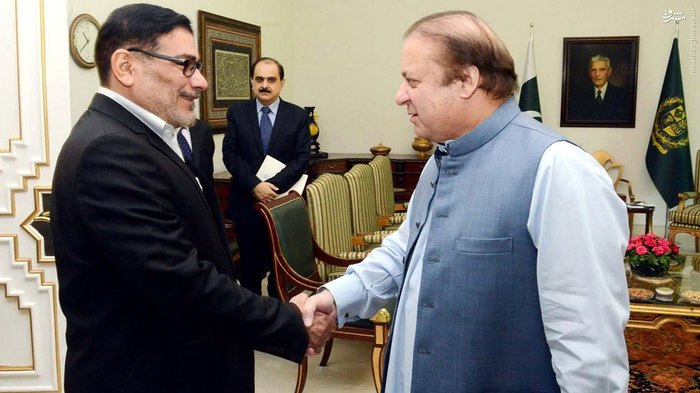Tehran and Islamabad in the post-JCPOA Era

(Photo: Head of Iran's National Security Council Ali Shamkhani shakes hand with Pakistan PM Navaz Sharif; Source: IRNA)
In Pakistan, macrostructures and macro-policies of security are constrained by the country's inherent drawbacks. The three pillars of statehood, nation, territory and sovereignty are still in a problematic condition in this country. In replacement, ideology and the power of popular mobilization have served as the driving forces and survival elements of this country. That explains the intertwined role of religious scholars on the one hand, and security and military forces on the other, in controlling the state.
Seventy years after establishment of Pakistan, the crisis of nation-building still lingers, and has left its imprint on domestic security and politics of Pakistan. Territorial crises have resulted in separation of Eastern Pakistan (now Bangladesh) from Pakistan. The crises in boundaries have also been a main factor in endless tension and conflict between Pakistan and its two neighbors, India and Afghanistan.
Such restrictions have foiled Pakistan's efforts in becoming a regional power, even after acquisition of the nuclear bomb in 1997. Pakistan has been forced to function as a shadow actor in regional and international relations. The lasting shadow of India and Islamabad's constant fear about its northern borders, coupled with Afghanistan's historical claims over the Durand line places heavy psychological and security pressure Pakistan under.
Pakistan has been aware that stable relations with Iran and China guarantee its survival, and balance its security status, hence efforts to have close relations with these two neighbors. Close relations, however, do not imply that Pakistan does not enter challenge, competition or even tension with Tehran and Beijing. One can describe Pakistan's foreign policy as such: radical yet conservative, pragmatist and opportunist yet aggressive.
To cover its structural weaknesses, Pakistan has to play multiple roles at the same time. Financially, Islamabad relies on Riyadh's aids and also takes advantage of the Saudis' regional measures. Pakistan's acquisition of nuclear weapon was the outcome of a masterful maneuver among several players, including China, India, Russia and the US. Nonetheless, even going nuclear has failed to improve Pakistan's regional influence. This of course, as mentioned earlier, stems from the country's structural weaknesses.
In foreign policy, Pakistan also faces the problem of credibility deficit. In nearly all its diplomatic partnerships, Pakistan has proved an unreliable partner. Pakistan played a double game with Arab and Afghan Mujahedeen during the 1980s and 1990s war in Afghanistan, with the US in War against Terror, and Afghanistan's peace process. Its security cooperation with Iran, particularly in Afghanistan, has also been dubious.
In the post-JCPOA era, Pakistan is concerned not only about its future standing in extraregional relations, but also worries that Iran's increasing weight in security and strategic affairs will create multiple challenges for Islamabad in fields of security, politics and economy. Iran's new regional and extraregional relations can cause challenges for Pakistan in Kashmir, northwestern borders and Afghanistan, and strip Islamabad off its role as the security balance-maker of the region.
So far, Iran has refused to take advantage of Pakistan's soft spots, and despite Islamabad's pragmatist approach, Tehran has followed an ethical line in bilateral relations. The recent visit by Head of Iranian National Security Council Ali Shamkhani to Islamabad may have served a dual purpose: to reassure Iran's southeastern neighbor about Iran's security policies, and in the meantime, to warn Pakistan about any likely unconstructive behavior whether in bilateral ties or broader regional relations. Now that the nuclear issue has been settled, Islamabad can capitalize on new opportunities in the areas of security, politics and economy.
* This piece was originally published in Iranian Diplomacy Persian.

